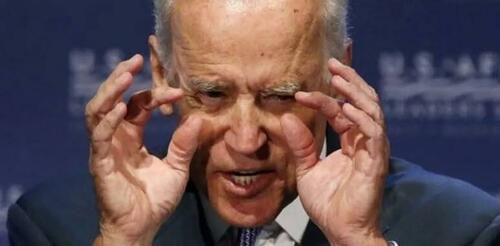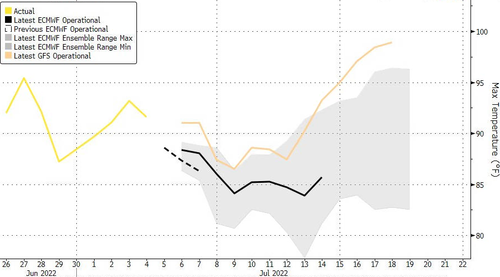Authored by Tom Luongo via Gold, Goats, ‘n Guns blog,
Over the weekend I was asked by Sputnik News to comment on why President Biden was so set on supporting Ukraine against Russia with money and weapons despite abysmal approval ratings and a fiscal budget hole that widens daily.
Here’s a link to the article Sputnik published. They give me pretty much the second half of the article.
Meanwhile, American geopolitical analyst Tom Luongo remarked that the ongoing conflict in the eastern European nation is nothing more than a “war between civilizations,” in US neoconservatives’ efforts to “forestall Russia taking control of Ukraine.”
Touching on Washington officials’ motives behind the ever-increasing aid to Kiev, Luongo told Sputnik that the American president, “as a proxy for the oligarchs in Davos, is acting on their behalf to ultimately weaken the US by sending weapons overseas and destroying US leadership and credibility.”

The short answer is what I’ve been saying for nearly three years now, The Davos Crowd wants the US destroyed and it is working from within and without our government to achieve that goal. Biden’s staunch support of Ukraine fits that thesis perfectly.
As I wrote about in my last article, depleting US and Western weapons stockpiles while exposing to the world the vulnerability of manufacturing is a key data point for the Global South to stand up publicly and defy Biden and Davos on any further attempts to isolate Russia.
I have to think, at a certain level, Biden is so out of touch with reality that he actually believes the sanctions are working and that Putin’s regime is going to collapse any time now. He’s as likely in the dark about the reality of the real situation as UAF army regulars fighting in the Donbass were about the real war, rather than the propaganda they were being fed.
Between now and the midterms you can expect further acceleration of the Davos agenda in D.C. Spending billions supporting Ukraine is yet another way to try to push the Fed into not raising rates any farther.
It’s a pathetic billion here, billion there. So, it’s truly irrelevant, but it shows the utter desperation of their position. If anything, these latest announced tranches of support are simply a mix of good ol’ fashioned payola to keep certain people quiet and a last grab at the till before it all gets shut down.
I know there are storm clouds of war on the horizon, and it’s clear that many within NATO are simply trying to draw out the fighting in Eastern Ukraine until such time that the West can counterstrike against Russia and drive her back.
Personally, I can’t see that strategy having any real support outside of the room where George Soros rails in his narcissistic dementia, but hey, that’s just me talking.
As always, thanks to Olga at Sputnik for her questions and here is the full text of what I sent to them.
This is yet more US funding for Ukraine. What are the motives behind continuously fueling Ukraine with money and military assistance?
It is a deep-seated need by neoconservatives to forestall Russia taking control of Ukraine. This conflict is a war between civilizations. Biden, as a proxy for the oligarchs in Davos, is acting on their behalf to ultimately weaken the U.S. by sending weapons overseas and destroying U.S. leadership and credibility.
This will only end when there is a real political revolution in the U.S.
This comes amid an economic crisis, Biden’s plummeting approval ratings and other hot issues in the US. Why is the Biden administration so focused on the conflict overseas instead of fixing problems at home?
He was put in charge to destroy the U.S. Biden and his administration are vandals. They are not acting in the U.S.’s best interests but have subordinated our public policy to the wishes of foreign powers. Too many conservatives want to align the DNC with China, but it’s clear that while China is helping erode the political cohesiveness of the U.S. it is Davos and their Climate Change/technocracy agenda that is pulling all the strings.
Why is the US not spending this money subsidizing the energy sector, for example, to maintain the country’s energy security and protect its citizens?
This question answers itself. The U.S. is being run by traitors. I wish it was more complicated than that. But it isn’t.
How long can the US economy afford to sponsor Washington’s ambitions?
Not much longer. This is why, at this late date, in my opinion, there is sincere and seriously organized pushback coming from the most unlikely place, some of the U.S. megabanks and the Federal Reserve, who is aggressively tightening monetary policy to drain the world of dollars and break both the offshore (Euro)dollar markets and put China’s financial partners, namely Hong Kong, under sincere pressure.
If the Fed doesn’t do this now, the odds of a political disintegration of the U.S. by the end of the decade rise dramatically.
Where does this massive funding package come from? Where does the US get the money for this huge amount?
For this year, from money already allocated, but ultimately Congress has to sell debt into the market which either has to be bought domestically, internationally or monetized by the Fed.
The Fed is raising rates to stop the money spigot in D.C. by forcing Congress to act more responsibly. Think of these spending allocations and pledges, like the $600 billion for global infrastructure to thwart China’s Belt and Road Initiative as attempts at blackmailing a reluctant Fed to monetize debt the world no longer wants to buy.
The Federal Reserve Bank of Atlanta warned that the US GDP might decrease 1% in second quarter of 2022. This could mean the start of a recession. How high are the chances of a large-scale economic collapse in the wake of this?
There is a large gulf between a recession and ‘large-scale economic collapse.’ The Fed can and should do what its doing to force resolutions on many outstanding geopolitical issues and imbalances. If it’s going to ‘act globally’ this is how is should do so, by taking away the punchbowl of offshore USD-based credit, Eurodollars, and regain control over its own monetary policy.
If that process causes a severe contraction and economic dislocation in the U.S. economy for a year or two that is the price one must pay to balance the books from the previous inflationary boom. I think the worst of those effects on the US economy will be blunted by the complete collapse of the European economy and sovereign debt markets, however. It won’t last forever, two maybe three years, but it will be enough time to effect real political change. We’ll know at this year’s mid-term elections what the American people really think about these things.




